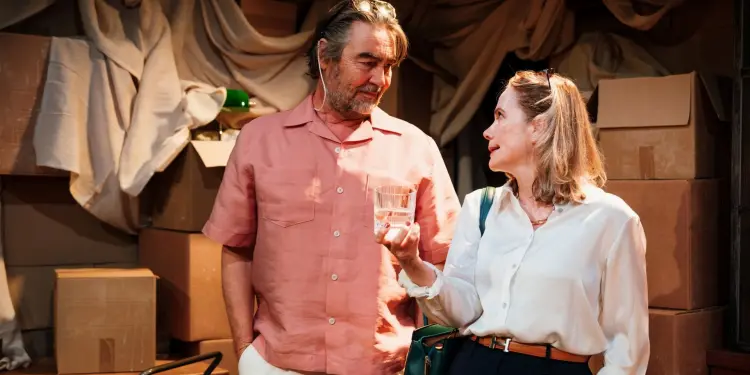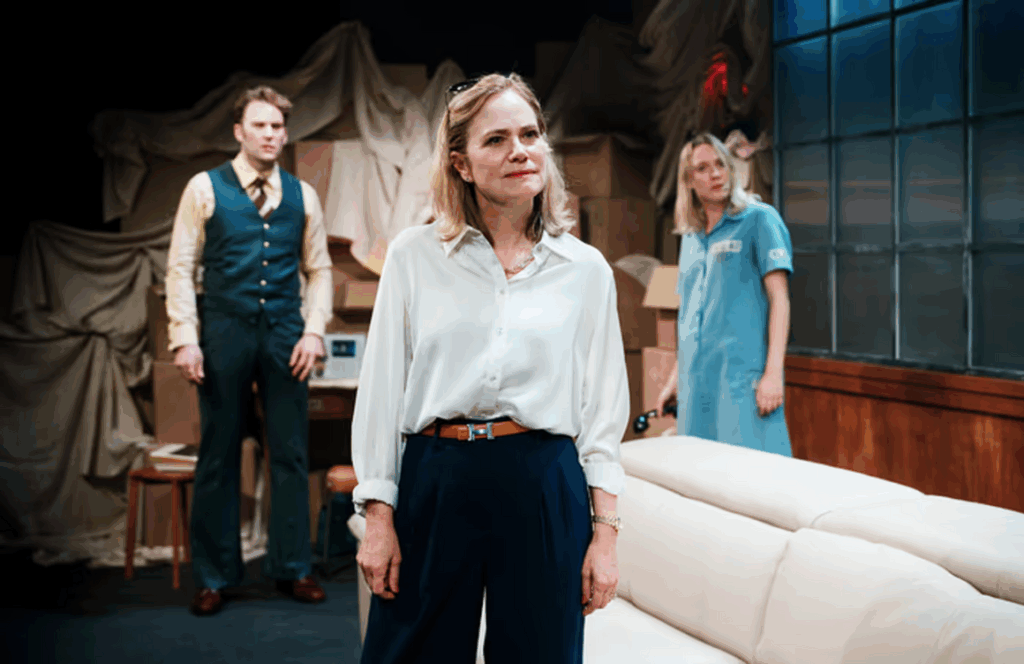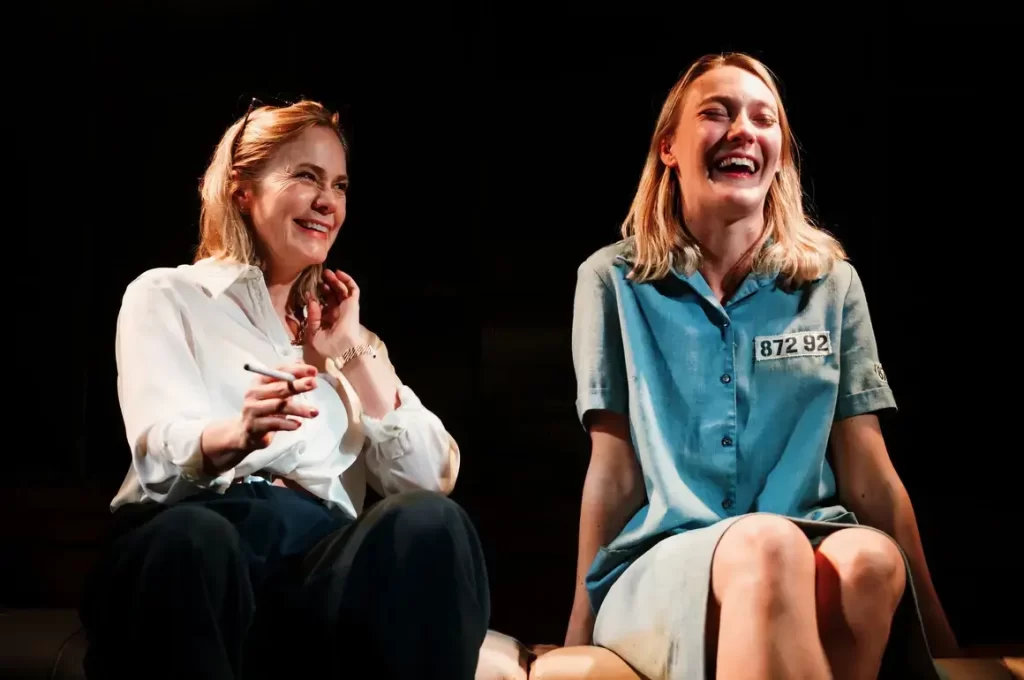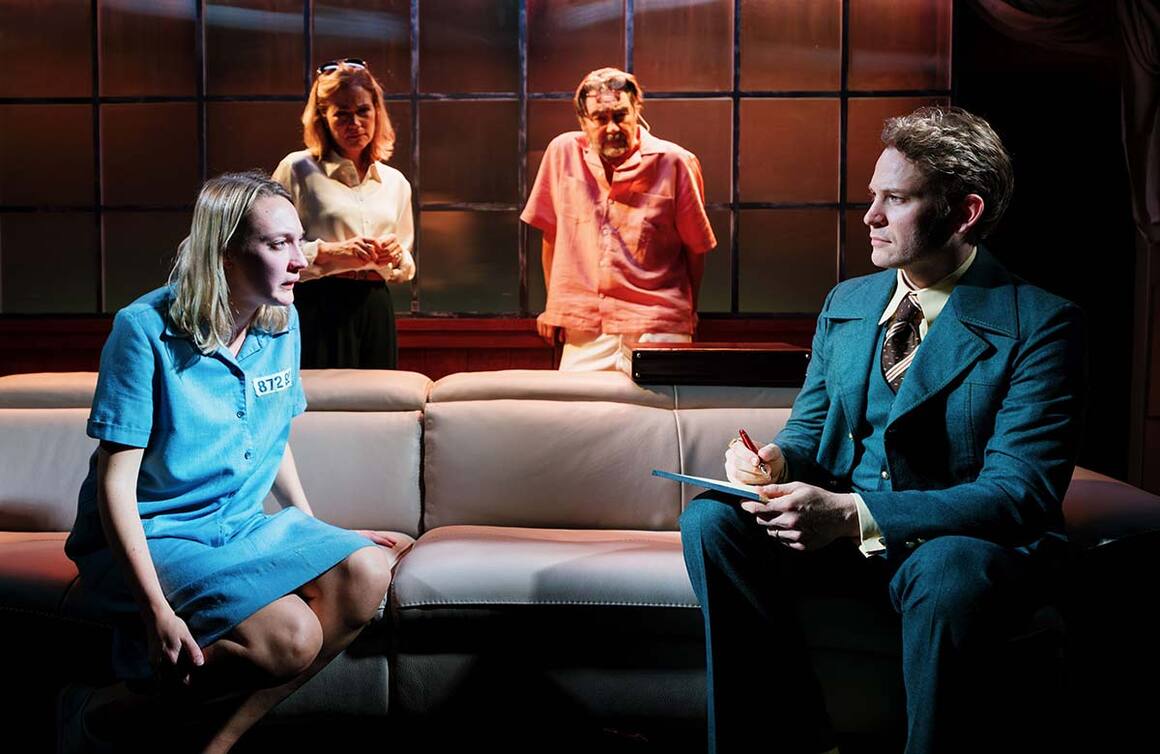Review by Simon Jenner, October 15 2025
★★★★(★)
“Did you drip on the carpet?” A woman bathed in sweat is ordered not to sit on the valuable sofa of the man she’s been asked to visit. A whole new level of touch me not is visited on the one person who can help a cancelled hot-shot lawyer. In 2017 Robert calls Holly whom he defended back in 1978: for joining a terrorist cell and robbing banks. He’s not spoken to her for nearly 40 years. Why should she sweat, be called unclean and stand for it? Based closely round the trial of heiress Patty Hearst’s kidnap, confinement in a closet, rape and subsequent radicalisation, Katherine Moar’s Ragdoll premieres at Jermyn Street, directed by Josh Seymour till November 15.
Moar’s known for her outstanding debut Farm Hall, which premiered here in 2023 before transferring to the West End. Farm Hall, using translated transcripts, is shaped round the bugging of six German nuclear scientists interned in Britain shortly before the atomic bombs were dropped. Moar is adept at fusing historical records; even more so at imaginative touches. Who’d have predicted the scientists would rehearse Blithe Spirit, however improbably? Someone was indeed out there.

Abigail Cruttenden, Nathaniel Parker in ‘Ragdoll’. Photo Credit; Alex Brenner
The title Ragdoll sounds unnervingly close to ‘Rosebud’. Citizen Kane and the Symbionese Liberation Army are directly referenced. Nominally ‘Ragdoll’ is part of Robert’s address, voiced once and left to hang. Moar’s closeness to Hearst’s and Attorney F Lee Bailey’s sources is, as it were, forensic. Even down to the latter’s leaving Harvard to turn naval air force pilot. And defending O.J. Simpson. The earlier fictive events are moved forward three years; Bailey’s plight different. It’s in the final scenes though that Moar unleashes her most thrilling theatrical writing to date. Ragdoll straddles one foot in Moar’s proved zone of record: kerned, compressed and tweaked brilliantly. The other steps from Pre-Raphaelite precision to Cubism. It’s exhilarating.
Alternating between early 2017 and 1978 in nine scenes, two sets of actors alternate for seven of them. Abigail Cruttenden (Holly) and Nathaniel Parker (Robert) stand off over that “rare” cream (“beige”) sofa, taking a huge central space in Ceci Calf’s set. It’s surrounded almost entirely by boxes as Robert prepares to downsize. There’s a bare chair and stool if anyone wants to sit. It’s different in 1978, as Ben Lamb (The Lawyer) and Katie Matsell (The Heiress), younger versions of Robert and Holly, by turns shuffle through cosy and stand-offish. Moar also mixes up one or two sequences. So we’re introduced to a Christmas crackers pull (a Scottish grandmother’s influence, clearly no Calvinist); then an uneasy first meeting also in 1978, after another stint in 2017. In Tom Paris’ costumes the 2017 couple are more casual than smart; in 1978 Robert’s snap-smart royal-blue suit contrasts with the heiress’s airmail blue, her numbered prison garb. Steadily lit by Jamie Platt there’s eerie pauses. Lex Kosanke’s music and sound though doesn’t spell out forty years of music between: things remain frozen.
Cruttenden, epitome of brittle dignity mixed with smarts from 40 years ago, here bears close resemblance to the later Hearst. Indeed all four do. Thankfully Moar’s characters are her own. Parker’s oiled attorney’s roar cracks from the start: the crime-scene pristineness of the sofa, and barely-suppressed aggression, dipped in narcissistic confidence, fills the space: cabin’d cribb’d confin’d by a role too small for him.
Robert’s disgrace is hinted: sexual, it’s skilfully set shortly before the #MeToo movement would sink cases like Robert’s. Holly’s testament could prove him honourable. It’s clutching at straws, which Robert casually snaps, dissing Holly. She’s followed his life and career. He’d only know if she’d died. Little of her subsequent life emerges, till glancingly in the final scene; more about Robert’s career and marriage. And his having stopped drinking for 15 years, a detail Holly is piqued by, considering events during the trial. Holly is still traumatised by Robert’s abandonment after the trial – his first failure. Later it’s dramatized.

Ben Lamb, Katie Matsell and Abigail Cruttenden in ‘Ragdoll’. Photo Credit; Alex Brenner
Moar eschews brainwashing as defence. Patty Hearst’s (and younger Holly’s) plea spins on a term never used in the trial or here: Stockholm Syndrome. It’s a subtlety of Moar’s to see how Holly transfers her feelings from her kidnappers (including explicit sexual references) to dependence on the young Robert’s approval. And despite his zero interest in her as a human being, she still wishes for it. Then there’s the mystery of ‘Ragdoll’ which house-name hangs as ‘Rosebud’ does in the referenced Citizen Kane; its private sexual connotations outed by Orson Welles: whose use enraged Randolph Hearst. When explicit language is used here it’s The Lawyer who quotes a letter The Heiress wrote. As Holly later asserts bitterly when asked if she resisted: “How things change. Forty years ago, it was sex. Now it’s rape.”
Equally, the Heiress is a ragdoll stuffed with every patriarchal bit of privilege, oppression, and punishment from both the ruling class and a bunch of authoritarian revolutionaries for being what she is: a site for projection and ownership.
Lamb as younger Robert or The Lawyer is drum-taut with ambition. In contrast to his older self he’s less urbane, slightly more human. Nevertheless at one point when he declares he “doesn’t give a shit about the girl” the person he confesses it to is singular. Matsell embodies even more of an entitlement the older Holly’s flattened out with wry grace and living. Matsell – hunched with mistrust like a cat – describes an arc between up-tight wariness soaring to hope and a desperate plea to be heard in a flight of unanswered phone-calls. Her harsh yawl cuts through; Cruttenden’s Holly has learned to modulate.
That contrast is released in the final scenes, when two sets of actors crash into each other. It allows questions that till then can’t be imagined. It’s Moar’s escape from a riveting if slightly undernourished confrontation over 80 minutes to rise into transcendent drama. It ends on a laconic, surprisingly Chekovian fade. Moar’s second play should follow Farm Hall into a West End transfer. Unmissable.
Movement Director: Anjali Mehra; Casting Director: Becky Paris CDG;
Dialect Coach: Andrea Fudge; Voice Coach: Tess Dignan
Katie Matsell and Abigail Cruttenden in ‘Ragdoll’. Photo Credit; Alex Brenner



